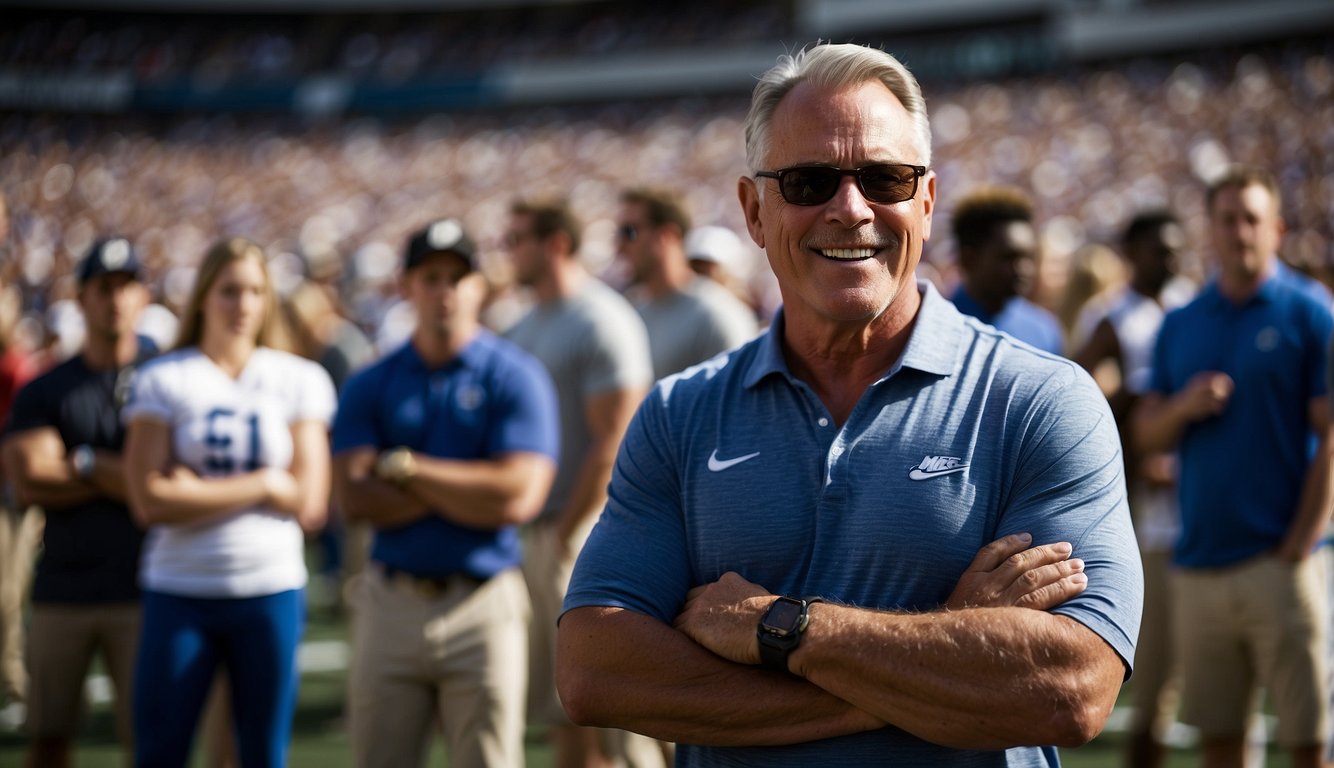Why Do College Football Coaches Get Paid More Than NFL Coaches?

The eye-opening salaries of college football coaches spotlight the unique financial dynamics at play within collegiate athletics. Unlike the more standardized pay scales seen in the NFL, the collegiate arena often showcases salaries that not only match but sometimes surpass those of the NFL’s top earners.
Related Post! Does College Football Get Bigger Crowds Than The NFL? Why?
Why Do College Football Coaches Get Paid More Than NFL Coaches?
College football coaches often earn more than their NFL counterparts due to the unique economic structure of college sports, including lucrative TV contracts, the absence of salary caps, and performance-based incentives tied to both athletic and academic achievements, which collectively amplify their earning potential.
At the core of many universities, the football program acts as the driving force behind the financial well-being of entire athletic departments. From ticket sales to merchandise, and the palpable spirit of school pride and alumni engagement, much revolves around the gridiron successes.
This deep-seated connection prompts universities to invest substantially in securing top-tier coaching talent, recognizing the dual role these individuals play as both strategists on the field and vital recruiters and ambassadors off it.
Unpacking the Financial Playbook
To grasp the rationale behind the hefty paychecks of college football coaches, it’s essential to dive into the economic structure underpinning college sports. This complex financial web weaves together diverse revenue streams, creating a robust support system for these significant salaries.

Revenue Playmakers:
- TV Contracts: The broadcasting of games is a lucrative affair, with networks investing billions, thereby channeling substantial funds back to the colleges.
- Fan Contributions: Every ticket purchased and piece of merchandise worn contributes to the financial pool, enhancing the university’s revenue.
- Brand Partnerships: Companies vying for visibility and association with popular college teams inject further funds through sponsorships and endorsements.
Financial Game Plan:
This influx of income is strategically allocated across the athletic department, covering everything from coaches’ salaries to scholarships, facility upkeep, and the sustenance of various programs. The allocation reflects the prioritization and investment in ensuring the success and competitiveness of the athletic offerings.
Budget Breakdown:
- Coaches’ Salaries: A variable yet pivotal allocation, reflecting the value placed on leadership and success.
- Scholarships: A significant investment in nurturing athletic talent.
- Facilities: Substantial funds are dedicated to maintaining and enhancing sporting infrastructures.
- Support for Other Programs: The remaining funds are distributed to support the breadth of the athletic department’s offerings.
Understanding these financial intricacies illuminates the rationale behind the commanding salaries of college football coaches. Their compensation mirrors the anticipated value and revenue generation they bring to the university’s athletic ecosystem, underlining the integral link between on-field performance and the broader financial health of the sports department.
Related Post! NCAA Vs. NFL: Is College Or Professional Football Bigger?
Market Demand and Revenue Generation

The jaw-dropping salaries of college football coaches are a testament to the sport’s status not just as a game, but as a cultural titan with immense revenue-generating power. Particularly within the Power Five conferences, the financial incentives are clear: lucrative television contracts, bustling merchandise sales, and booming ticket revenues all underscore the high stakes. The crux of the matter is simple – winning translates into financial prosperity for the institutions involved.
The Winning Formula:
- High-caliber coaches catalyze program success, setting off a chain reaction of benefits.
- Victorious programs magnetize fans, spiking ticket sales and merchandise revenue.
- Coaches often embody the university’s public persona, their roles intertwining with fundraising, PR, and community ties, making their revenue-generating capacity pivotal.
Athletic Triumphs and Financial Rewards:
- Winning Record: A stronger win ratio can dramatically uplift ticket and merchandise sales.
- Bowl Appearances: These coveted slots bring in sponsorships and bolster funding.
- National Recognition: Ascending the ranks enhances the university’s appeal, potentially boosting enrollment and the institution’s overall prestige.
In contrast to the NFL’s uniform salary structures and revenue sharing, college football’s economic landscape allows for greater variability, with market demand and a coach’s ability to generate revenue justifying substantial salaries. The essence of college football, with its deep-rooted community ties and the significant role of coaching in maintaining competitive edge and financial flow, sets it apart from the professional league.
Related Post! What’s The Average NFL Coach Salary?
Strategic Financial Plays in Higher Education
The hefty paychecks of college football coaches often reflect broader institutional strategies, where football programs are sometimes deemed paramount for their role in shaping university identity and fostering alumni connections.

Budget Playbook Insights:
- Television Contracts: These are gold mines for universities, directly fueling their financial engines and enabling substantial investments in football, including coach salaries.
- Merchandise Momentum: Success on the field can translate to a surge in branded merchandise sales, further justifying investment in top coaching talent.
- Alumni Engagement: A successful football season can translate into heightened alumni satisfaction, often reflected in more generous donations.
This allocation of resources towards football programs, and by extension to coach salaries, is not merely a financial decision; it’s an investment in the university’s brand, community spirit, and future. The rationale goes beyond mere dollars and cents, embracing the intangible value a successful coach adds to the collegiate experience.
Financial Touchdowns and Cultural Capital:
- Television Exposure: A major revenue stream that supports significant investment in football, including competitive coach salaries.
- Branding Boost: Success on the field can lead to a merchandise sales bonanza, underpinning the financial logic of high coach salaries.
- Alumni Contributions: The ripple effect of football success can lead to increased alumni donations, reinforcing the financial and cultural rationale for substantial coach compensation.
In the grand scheme, the decision to allocate significant funds to college football coach salaries is a multifaceted strategy, betting on a return that encompasses financial gains, enhanced community engagement, and a bolstered institutional identity.
Related Post! Why Are College Football Tickets So Expensive?
Media Rights and Broadcasting Deals
The financial playbook of college football is dominated by TV contracts, a crucial revenue source that far surpasses gate receipts and merchandising. Networks such as ABC and ESPN enter into multi-billion dollar agreements to broadcast the adrenaline-pumping action of college games, setting the stage for a lucrative revenue-sharing model that benefits schools and conferences alike.

Broadcasting Bonanza:
- TV Contracts: The lifeblood of college sports finance, these contracts with major networks are worth billions, spotlighting the immense value of broadcasting rights.
- Revenue Sharing: This windfall is then distributed among the participating institutions, significantly bolstering their athletic budgets.
The magnetic appeal of college football, with its unique blend of tradition, rivalry, and raw talent, ensures a captive audience and a steady flow of advertising revenue. This broadcasting leverage gives college football a financial edge, allowing for more flexible compensation strategies for coaches, unbound by the salary caps and more uniform revenue distribution seen in the NFL.
The Coaching Edge:
- Rights and Revenue: Media deals not only enrich the sport but also indirectly pump up the potential earnings for top coaches.
- Strategic Advantage: The absence of NFL-style revenue sharing and salary caps in college football empowers schools to negotiate more aggressively on behalf of their coaching staff.
These lucrative media agreements underscore the high stakes of college football, where the broadcast of regular season games and postseason showdowns translates into significant coaching paychecks. The proof is in the pudding—or rather, the detailed financial analyses available in resources like USA TODAY, offering an insider’s view of the economic mechanisms at play.
Beyond the Sidelines: Coaching in College Football
Coaching in the collegiate ranks is a multifaceted endeavor, extending far beyond game-day tactics to encompass recruitment, player development, and academic guidance. College coaches are instrumental in shaping their teams, from scouting promising high school talent to molding well-rounded student-athletes.

Coaching Commitments:
- Recruitment: A critical duty, involving extensive travel and engagement to attract top talent.
- Player Development: Beyond physical training, focusing on academic achievement and personal growth.
- Strategic Oversight: The intellectual backbone of the team, crafting and executing game plans.
In this arena, coaches are more than strategists; they are the linchpins of their programs, significantly influencing the university’s athletic reputation and financial health.
Incentive Playbook:
- Victory Bonuses: Rewards tied to win milestones, acknowledging on-field success.
- Academic Excellence: Bonuses linked to the team’s academic performance, emphasizing the student in student-athlete.
- Title Pursuits: Additional compensation for clinching conference or national championships.
- Fan Engagement: Incentives related to boosting ticket sales and merchandising revenue.
These performance-based incentives reflect the expansive role of college football coaches, combining the drive for athletic triumph with the pursuit of academic integrity and community engagement. This comprehensive responsibility spectrum often translates into a compensation package that rivals, and sometimes exceeds, that of NFL coaches, highlighting the unique economic and cultural fabric of college football.
FAQs
What are the main revenue sources for college football programs?
Major revenue streams include TV contracts, ticket sales, merchandise, sponsorships, and alumni donations.
How do TV contracts influence college football coaches’ salaries?
TV contracts bring significant revenue to college football programs, allowing for more flexibility in coach compensation, including higher base salaries and performance bonuses.
Why doesn’t the NFL’s salary cap affect college football coaches?
College football operates independently of the NFL’s regulations, including salary caps, allowing universities to offer competitive compensation packages to attract top coaching talent.
What role do performance incentives play in a college football coach’s salary?
Performance incentives can significantly increase a coach’s salary, rewarding athletic success, academic achievements of the team, and contributions to the program’s overall prestige and financial health.
Can a college football coach’s success impact university revenue beyond the sports program?
Yes, a successful football program can enhance the university’s profile, increase admissions interest, boost merchandise sales, and stimulate alumni donations, contributing to overall financial health.
